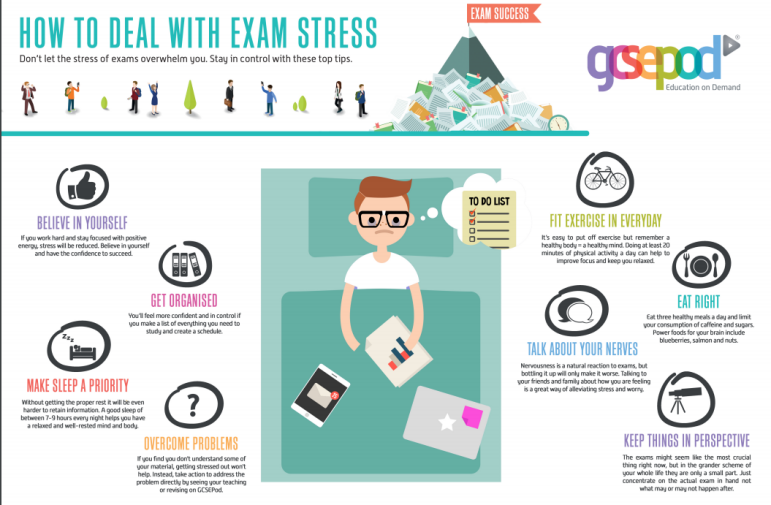Exam Stress & Anxiety
Tests and exams can be a very stressful time for students and for some leading to worry, sleepless nights and becoming irritable, resulting in a lack of focus and motivation. It is therefore important that students feel they can talk about their worries and take care of their wellbeing.
Beating Exam Stress

Here is an article from the guardian in 2016 of ways to help beat exam stress https://www.theguardian.com/teacher-network/2016/jun/08/seven-scientific-ways-beat-panic-exam
Seven scientific ways to beat the onset of panic in an exam
The thought of the exam hall. The noise of the invigilator walking up and down. The deafening sound of the clock ticking. For some students, the pressure and stress of exams can be suffocating.
The students who are most likely to perform well under pressure have a very specific outlook and will have repeatedly practised nurturing this so it comes as second nature. But now that exams are here, the time for that has passed. So what is the best advice for those who are prone to panicking?
Take a deep breath
When under pressure, your brain becomes awash with hormones such as adrenaline and cortisol. In many cases, this makes people speed up, as they think they have less time left than they actually do.
Researchers have also discovered a vicious cycle between emotions and heart rate. The more stressed you are, the faster your heart beats. But a faster heart-rate is often interpreted as stress, which means a tough situation can quickly escalate. If you pause for a moment and take a deep breath, this helps everything slow down and break the cycle.
Read the question twice – without holding your pen
One of the most frequent mistakes made in an exam is misreading the question. Re-reading a question sounds so simple, but it’s amazing how easily this can lapse. For students who have low impulse control, try recommending they put down their pen when they read the question. This will help counteract the urge to rush and write down an answer immediately.
Think back to your revision: have you answered similar questions before?
Even if a student hasn’t faced the exact same question before, remembering a successful thought process can help them get started. This is because it helps students be aware of their thought processes and select an effective way of thinking about a problem, rather than panicking. This concept of thinking about your thinking, known as metacognition, has been found to be one of the most effective strategies for improving self-awareness and self-regulation.
What would your teacher say?
Psychologists often talk about the Dunning-Kruger effect, which explains why novices often tend to overestimate their abilities and are less aware of their limitations. Teachers can circumvent this among students by asking them to place themselves in the shoes of someone older or wiser. Chances are that over the previous months teachers will have repeatedly given advice and suggestions on how best to go about answering a question. Asking “What would my teacher say?” should help students get on track.
Better to guess the answer than leave it blank
Write nothing at all and you are guaranteed to get zero. Sport fans (as well as viewers of Broadwalk Empire) know this as “a shot to nothing”, as you have nothing to lose if it goes wrong. The only caveat here is at university, where some exams are negatively marked.
Stick to your exam strategy
It’s easy, when faced with a tricky question, to feel put off and demoralised. But having an exam strategy can help students stay focused.
Our brains crave certainty and control. When we feel unsure of what to do, or that we have no influence on the outcome, we tend to feel more stressed and anxious. By focusing on a pre-prepared game plan, students can wrestle back this feeling of certainty and control.
Don’t put too much pressure on yourself
Some stress can help aid performance, but excessive pressure often stops people from thinking clearly. One sign that psychologists say is an indication that a person is under too much pressure is thinking in extremes. This might include phrases such as “I have to get full marks” and “I must write at least four pages to answer this question”.
This all-or-nothing thinking (sometimes referred to as splitting) isn’t helpful. Students should be encouraged to practise self-compassion and be kind to themselves in the exam. This can be done by using words and phrases such as “sometimes”, “I could” or “I might”. For example, “I might write four pages in answer to this question, but if I’m struggling and running out of time, it’s better to move on.”

